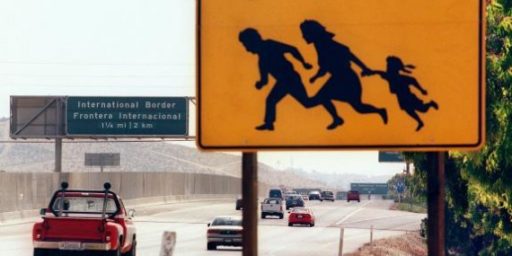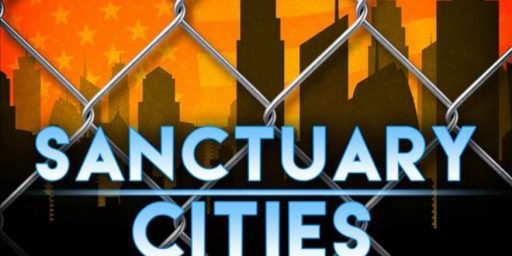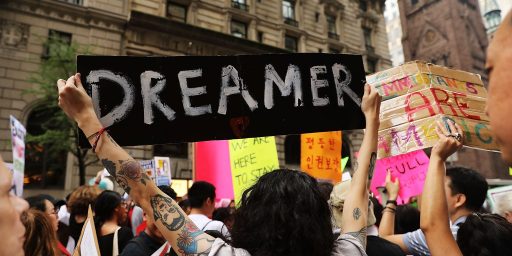Court Strikes Down Local Illegal Alien Law
A federal court has ruled that localities are prohibited from regulating United States international borders.
A U.S. judge on Thursday struck down as unconstitutional a local law designed to crack down on illegal immigration, dealing a blow to similar laws passed by dozens of towns and cities across the country.
U.S. District Judge James Munley said the city of Hazleton, 100 miles north of Philadelphia, was not allowed to implement a law that would fine businesses that hire illegal immigrants and penalize landlords who rent rooms to them.”Federal law prohibits Hazleton from enforcing any of the provisions of its ordinances,” Munley wrote in a 206-page opinion following a federal trial in which Hazleton’s law was challenged by civil rights groups.
The city of 30,000 blames a recent rise in illegal immigration for boosting crime and overburdening social services. The law was passed in July 2006 but was not implemented because of a court injunction won by opponents. About a third of the city’s residents are immigrants from Central America and around a quarter of the immigrant population is believed to be undocumented, according to civil rights campaigners.
Hazleton Mayor Lou Barletta said the city would likely appeal the decision. “I believe both sides realized this wasn’t going to be the last day. This small city isn’t ready to stop fighting yet,” Barletta told CNN.
This one was a no-brainer and, unless they had no brains, Hazleton’s politicians damned well knew it. One understands the frustrations of local officials, who have to bear the brunt over the inability or unwillingness of the federal government to enforce our immigration laws. Still, they obviously don’t have jurisdiction.






I don’t think this is so clear cut. The local ordinance is using the federal definition of an illegal immigrant, so they aren’t usurping federal authority there. I would be interested to find out what federal law would be seen to be violated.
James
Nice to see you use the insult trick of calling anyone who disagrees with you as having no brains.
First the locals are not regulating International borders. They are not saying who or who cannot cross the borders or in what numbers. They are making law that pertains to their local community.
Second if the Federal government refuses to uphold it own laws, does that mean the local government must ignore federal laws also? The key word here is illegal. Legal visitors or immigrants would be an entirely different case. Shouldn’t a local government be able to revoke a sales license to a shop that sells illegal Cuban cigars or illegal drugs, which are both federal crimes? Granted they may not be required to all the time but it should be their option to help enforce federal laws especially if those lawbreakers are harming their communities.
Maybe Hazelton will pull the crap my city (Philadelphia) is attempting. Namely, suing the Commonwealth for the right to make their own gun laws. Hell, if the idiots in Philly’s City Council can try that garbage, why can’t Hazelton?
Wyatt Earp,
Because Philly has a home rule charter, and Hazleton does not.
I’m probably just too stupid to ever understand.
Why is it bad when state or local governments try to enforce immigrations laws, but good when they want to enforce drug laws or anti-Second Amendment gun laws?
It seems to me that this result will add a little weight to state and local suits against the federal government to secure funding to pay for schools, law enforcement, and health care for illegal aliens.
Granted that it takes little to amuse me sometimes, but I’m thinking of what happens if that federal court decision gets overturned….
Hmmm, I don’t see the rub. It makes sense to me that if the Feds won’t enforce the immigration laws then the locals should take charge. Who better to deal with a local situation????????
So no one here knows what “Federal law prohibits Hazelton from enforcing any of the ordinances”?
+++++Why is it bad when state or local governments try to enforce immigrations laws, but good when they want to enforce drug laws or anti-Second Amendment gun laws?+++++
because the last 2 don’t get you no new voter block, census numbers,polling numbers, or commie Liberal street cred.
The judge in this case is a Clinton appointee. Aiding and abed ding criminals should not be forbidden to those who think the way these people do. If precedent is set here and the ruling stands, it will be OK to help and assist those running from the law outside of local jurisdiction. If it is OK to rent to those here illegally, why is it not OK to help the person who robbed a bank in the next state?
May be wrong but Im hearing that this ruling is nonsense. States and cities have apparently always had the authority to enforce federal CIVIL laws. Which immigration is.
After all, they can get federal training via 287g which allows them to enforce all immigration laws, whcih the feds refuse to do. Many cities are putting their locals thru the 287g stuff now.
You lawyers up on this take….?
I’m sorry? What do you mean they don’t have jurisdiction? Your position implies that local gov’t cannot enforce any national law. So local police and government are supposed to ignore any and all Federal law because they don’t have jurisdiction?.
If true, great, ’cause there are a whole bunch of Federal laws that should be ignored. This however isn’t one of them.
I’m not going to attempt a full explanation, but for those really interested this might point you in the right direction (right meaning the current answer for a law school test). The law that Hazelton would be deemed to violate is the 14th Amendment, “No State shall…deny to any person within its jurisdiction the equal protection of the laws.” So Hazelton can’t deny benefits to people from Ohio, and they can’t deny to people from El Salvador either. The Supreme Court held a long time ago 5-4 in Plyler v. Doe that this applied to non-citizens that a state believed were in the state unlawfully under federal immigration laws. There are times that states can treat people unequally, but in the illegal immigration context, there perhaps is not enough wiggle room for the district judge to get around that Supreme Court precedent, which he is required to follow. The district judge, whether appointed by Clinton or Reagan or whoever, can’t just sit there and make stuff up. If Hazelton appeals to the Circuit they will probably lose there too for the same reason, but if it gets to the Supreme Court, the Supreme Court might reverse Plyler.
But it is possible to see why one wouldn’t want states and localities to be deciding who they think is “legal.” The real federal policy under each of at least the last four presidents is that we don’t really want to close the border. If the federal government was really trying to deport everyone, the U.S. attorney could put out warrants for arrest and then, sure, the Hazelton police could pick them up and deliver them to federal custody. But Hazelton police can’t go around and pick people up based upon their own (different) view of federal law, any more than I can.
RE: “I’m not going to attempt a full explanation, but for those really interested this might point you in the right direction (right meaning the current answer for a law school test). The law that Hazelton would be deemed to violate is the 14th Amendment, “No State shall…deny to any person within its jurisdiction”
What the 14th says is:
Section. 1. All persons born or naturalized in the United States and subject to the jurisdiction thereof, are citizens of the United States and of the State wherein they reside. No State shall make or enforce any law which shall abridge the privileges or immunities of citizens of the United States; nor shall any State deprive any person of life, liberty, or property, without due process of law; nor deny to any person within its jurisdiction the equal protection of the laws.